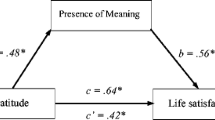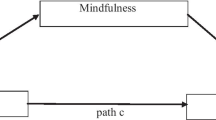Abstract
The present study assesses the underlying mechanism of gratitude on life satisfaction among adolescents in a post-disaster context. The mediating roles of social support, self-esteem, and hope are also examined in the relation between gratitude and life satisfaction. Two and a half years after the Ya’an earthquake, 397 adolescents were selected from the most severely affected county of Lushan to answer self-reported questionnaires. After controlling for trauma severity, gratitude can have a positive association with life satisfaction through the following routes: one one-mediator paths of hope, two two-mediator paths of social support via self-esteem and self-esteem via hope, and one three-mediator path from social support to hope via self-esteem. These findings suggested that following a natural disaster, adolescent survivors’ gratitude may have an indirect and positive relation with life satisfaction by social support, self-esteem, and hope.


Similar content being viewed by others
References
Anderson, J. C., & Gerbing, D. W. (1988). Structural equation modeling in practice: A review and recommended two-step approach. Psychological Bulletin, 103, 411–423.
Carpenter, K. M., Fowler, J. M., & Andersen, B. L. (2010). Direct and buffering effects of social support among gynecologic cancer survivors. Annals of Behavioral Medicine, 39, 79–90.
Carver, C. S., & Scheier, M. F. (1998). On the self-regulation of behavior. Cambridge, England. Cambridge University Press.
China Daily. (April 20, 2013). Live report: 7.0-magnitude quake hits SW China’s Sichuan. http://www.chinadaily.com.cn/china/2013sichuanquake/2013-04/20/content_16426485.htm. Access 17 Oct 2016.
Çivitci, N., & Çivitci, A. (2009). Self-esteem as mediator and moderator of the relationship between loneliness and life satisfaction in adolescents. Personality and Individual Differences, 47, 954–958.
Cohen, S., & Syme, S. L. (1985). Issues in the study and application of social support. In C. S & S. SL (Eds.), Social support and health (Vol. 3, pp. 3–22). Orlando: Academic Press.
Diener, E. D., Emmons, R. A., Larsen, R. J., & Griffin, S. (1985). The satisfaction with life scale. Journal of Personality Assessment, 49, 71–75.
Emmons, R. A., & McCullough, M. E. (2003). Counting blessings versus burdens: An experimental investigation of gratitude and subjective well-being in daily life. Journal of Personality and Social Psychology, 84, 377–389.
Emmons, R. A., & Mishra, A. (2011). Why gratitude enhances well-being: What we know, what we need to know. In K. M. Sheldon, T. B. Kashdan, & M. F. Steger (Eds.), Designing positive psychology: Taking stock and moving forward (pp. 248–262). New York, NY: Oxford University Press.
Fredrickson, B. L. (2001). The role of positive emotions in positive psychology: The broaden-and-build theory of positive emotions. American Psychologist, 56, 218–226.
Fredrickson, B. L. (2004). Gratitude, like other positive emotions, broadens and builds. In R. A. Emmons & M. E. McCullough (Eds.), The psychology of gratitude (pp. 145–166). New York: Oxford University Press.
Fredrickson, B. L., & Branigan, C. (2005). Positive emotions broaden the scope of attention and thought-action repertoires. Cognition & Emotion, 19, 313–332.
Froh, J. J., & Bono, G. (2008). The gratitude of youth. In S. J. Lopez (Ed.), Positive psychology: Exploring the best in people (pp. 55–78). Westport, CT: Greenwood Publishing Company.
Froh, J. J., Yurkewicz, C., & Kashdan, T. B. (2009). Gratitude and subjective well-being in early adolescence: Examining gender differences. Journal of Adolescence, 32, 633–650.
Gibson, P. R. (1999). Hope in multiple chemical sensitivity: Social support and attitude towards healthcare delivery as predictors of hope. Journal of Clinical Nursing, 8, 275–283.
Hobfoll, S. E. (2001). The influence of culture, community, and the nested-self in the stress process: Advancing conservation of resources theory. Applied Psychology, 50, 337–421.
Huebner, E. S., Gilman, R., & Laughlin, J. E. (1999). A multimethod investigation of the multidimensionality of children's well-being reports: Discriminant validity of life satisfaction and self-esteem. Social Indicators Research, 46, 1–22.
Kashdan, T. B., Uswatte, G., & Julian, T. (2006). Gratitude and hedonic and eudaimonic well-being in Vietnam war veterans. Behaviour Research and Therapy, 44, 177–199.
Kimball, M., Levy, H., Ohtake, F., & Tsutsui, Y. (2006). Unhappiness after hurricane Katrina. National Bureau of Economic Research Working Paper No. 12062.
Kohut, H. (1984). How does analysis cure? New York: International Universities Press.
Kong, F., & You, X. (2013). Loneliness and self-esteem as mediators between social support and life satisfaction in late adolescence. Social Indicators Research, 110, 271–279.
Kong, F., Zhao, J., & You, X. (2012). Emotional intelligence and life satisfaction in Chinese university students: The mediating role of self-esteem and social support. Personality and Individual Differences, 53, 1039–1043.
Kong, F., Ding, K., & Zhao, J. (2015). The relationships among gratitude, self-esteem, social support and life satisfaction among undergraduate students. Journal of Happiness Studies, 16, 477–489.
Krause, N. (2006). Gratitude toward god, stress, and health in late life. Research on Aging, 28, 163–183.
Krech, G. (2001). Naikan: Gratitude, grace, and the Japanese art of self-reflection. Berkeley, CA: Stone Bridge Press.
Lee, R. M., & Robbins, S. B. (1995). Measuring belongingness: The social connectedness and the social assurance scales. Journal of Counseling Psychology, 42, 232–241.
Lee, R. M., Draper, M., & Lee, S. (2001). Social connectedness, dysfunctional interpersonal behaviors, and psychological distress: Testing a mediator model. Journal of Counseling Psychology, 48, 310–318.
Leung, J. P., & Leung, K. (1992). Life satisfaction, self-concept, and relationship with parents in adolescence. Journal of Youth and Adolescence, 21, 653–665.
Li, D., Zhang, W., Li, X., Li, N., & Ye, B. (2012). Gratitude and suicidal ideation and suicide attempts among Chinese adolescents: Direct, mediated, and moderated effects. Journal of Adolescence, 35, 55–66.
Liang, Y. (2016). Trust in Chinese government and quality of life (QOL) of Sichuan earthquake survivors: Does trust in government help to promote QOL? Social Indicators Research, 127, 541–564.
Lu, M., Yang, G., Skora, E., Wang, G., Cai, Y., Sun, Q., & Li, W. (2015). Self-esteem, social support, and life satisfaction in Chinese parents of children with autism spectrum disorder. Research in Autism Spectrum Disorders, 17, 70–77.
Luechinger, S., & Raschky, P. A. (2009). Valuing flood disasters using the life satisfaction approach. Journal of Public Economics, 93, 620–633.
Marques, S. C., Lopez, S. J., & Mitchell, J. (2013). The role of hope, spirituality and religious practice in adolescents’ life satisfaction: Longitudinal findings. Journal of Happiness Studies, 14, 251–261.
McCullough, M. E., Kilpatrick, S. D., Emmons, R. A., & Larson, D. B. (2001). Is gratitude a moral affect? Psychological Bulletin, 127, 249–266.
McCullough, M. E., Emmons, R. A., & Tsang, J. A. (2002). The grateful disposition: A conceptual and empirical topography. Journal of Personality and Social Psychology, 82, 112–127.
Muthén, B. O., Muthén, L. K. (2010). Mplus (version 6.00)[computer software]. Los Angeles, CA: Muthén & Muthén.
Peterson, C., & Seligman, M. E. P. (2004). Character strengths and virtues: A handbook and classification. Washington, DC: American Psychological Association.
Pyszczynski, T., Greenberg, J., Solomon, S., Arndt, J., & Schimel, J. (2004). Why do people need self-esteem? A theoretical and empirical review. Psychological Bulletin, 130, 435–468.
Robustelli, B. L., & Whisman, M. A. (2016). Gratitude and life satisfaction in the United States and Japan. Journal of Happiness Studies, 1–15.
Rosenberg, M. (1989). Society and the adolescent self-image. Middeltown, CT: Wesleyan University Press.
Sattler, D. N., de Alvarado, A. M. G., de Castro, N. B., Male, R. V., Zetino, A. M., & Vega, R. (2006). El Salvador earthquakes: Relationships among acute stress disorder symptoms, depression, traumatic event exposure, and resource loss. Journal of Traumatic Stress, 19, 879–893.
Scheier, M. F., & Carver, C. S. (1985). Optimism, coping, and health: Assessment and implications of generalized outcome expectancies. Health Psychology, 4, 219–247.
Seligman, M. E. P. (2002). Authentic happiness: Using the new positive psychology to realize your potential for lasting fulfillment. New York: Free Press.
Setliff, A. E., & Marmurek, H. H. C. (2002). The mood regulatory function of autobiographical recall is moderated by self-esteem. Personality and Individual Differences, 32, 761–771.
Snyder, C. R., Irving, L., & Anderson, J. R. (1991). Hope and Heealth: Measuring the Will and the Ways. In C. R. Snyder & D. R. Forsyth (Eds.), Handbook of social and clinical psychology: The health perspective (pp. 285–305). Elmsford, NY: Pergamn.
Snyder, C. R., Sympson, S. C., Ybasco, F. C., Borders, T. F., Babyak, M. A., & Higgins, R. L. (1996). Development and validation of the state Hope scale. Journal of Personality and Social Psychology, 70, 321–335.
Snyder, C. R., Michael, S. T., & Cheavens, J. S. (1999). Hope as a psychotherapeutic foundation of common factors, placebos, and expectancies. In M. A. Hubble, B. L. Duncan, & S. D. Miller (Eds.), The heart and soul of change: What works in therapy (pp. 179–200). Washington: American Psychological Association.
Snyder, C. R., Rand, K. L., & Sigmon, D. R. (2002). Hope theory: A member of the positive psychology family. In C. R. Snyder & S. Lopez (Eds.), Handbook of positive psychology (pp. 257–266). New York: Oxford University Press.
Sugano, S. (2016). The well-being of elderly survivors after natural disasters: Measuring the impact of the great East Japan earthquake. The Japanese Economic Review, 67, 211–229.
Taylor, J., & Turner, R. J. (2001). A longitudinal study of the role and significance of mattering to others for depressive symptoms. Journal of Health and Social Behavior, 42, 310–325.
Toussaint, L., & Friedman, P. (2009). Forgiveness, gratitude, and well-being: The mediating role of affect and beliefs. Journal of Happiness Studies, 10, 635–654.
Truitt, M., Biesecker, B., Capone, G., Bailey, T., & Erby, L. (2012). The role of hope in adaptation to uncertainty: The experience of caregivers of children with down syndrome. Patient Education and Counseling, 87, 233–238.
Valle, M. F., Huebner, E. S., & Suldo, S. M. (2006). An analysis of hope as a psychological strength. Journal of School Psychology, 44, 393–406.
Wethington, E., & Kessler, R. C. (1986). Perceived support, received support, and adjustment to stressful life events. Journal of Health and Social Behavior, 27, 78–89.
Wood, A. M., Joseph, S., & Linley, P. A. (2007). Coping style as a psychological resource of grateful people. Journal of Social and Clinical Psychology, 26, 1076–1093.
Wood, A. M., Joseph, S., & Maltby, J. (2008a). Gratitude uniquely predicts satisfaction with life: Incremental validity above the domains and facets of the five factor model. Personality and Individual Differences, 45, 49–54.
Wood, A. M., Maltby, J., Gillett, R., Linley, P. A., & Joseph, S. (2008b). The role of gratitude in the development of social support, stress, and depression: Two longitudinal studies. Journal of Research in Personality, 42, 854–871.
Wood, A. M., Maltby, J., Stewart, N., Linley, P. A., & Joseph, S. (2008c). A social-cognitive model of trait and state levels of gratitude. Emotion, 8, 281–290.
Wood, A. M., Joseph, S., & Maltby, J. (2009). Gratitude predicts psychological well-being above the big five facets. Personality and Individual Differences, 46, 443–447.
Yadav, S. (2010). Perceived social support, hope, and quality of life of persons living with HIV/AIDS: A case study from Nepal. Quality of Life Research, 19, 157–166.
You, S., Furlong, M. J., Felix, E., Sharkey, J. D., Tanigawa, D., & Green, J. G. (2008). Relations among school connectedness, hope, life satisfaction, and bully victimization. Psychology in the Schools, 45, 446–460.
Zhou, X., & Wu, X. (2016). Understanding the roles of gratitude and social support in posttraumatic growth among adolescents after Ya'an earthquake: A longitudinal study. Personality and Individual Differences, 101, 4–8.
Zhou, X., Wu, X., & Zhen, R. (2017). Understanding the relationship between social support and posttraumatic stress disorder/posttraumatic growth among adolescents after Ya’an earthquake: The role of emotion regulation. Psychological Trauma Theory Research Practice and Policy, 9, 214–221.
Funding
This research was supported by the General Research Program of Education Department of Zhejiang Province, China (Grant number: Y201840094).
Author information
Authors and Affiliations
Corresponding author
Additional information
Publisher’s Note
Springer Nature remains neutral with regard to jurisdictional claims in published maps and institutional affiliations.
Rights and permissions
About this article
Cite this article
Zhou, X., Zhen, R. & Wu, X. Understanding the Relation between Gratitude and Life Satisfaction among Adolescents in a Post-Disaster Context: Mediating Roles of Social Support, Self-Esteem, and Hope. Child Ind Res 12, 1781–1795 (2019). https://doi.org/10.1007/s12187-018-9610-z
Accepted:
Published:
Issue Date:
DOI: https://doi.org/10.1007/s12187-018-9610-z




